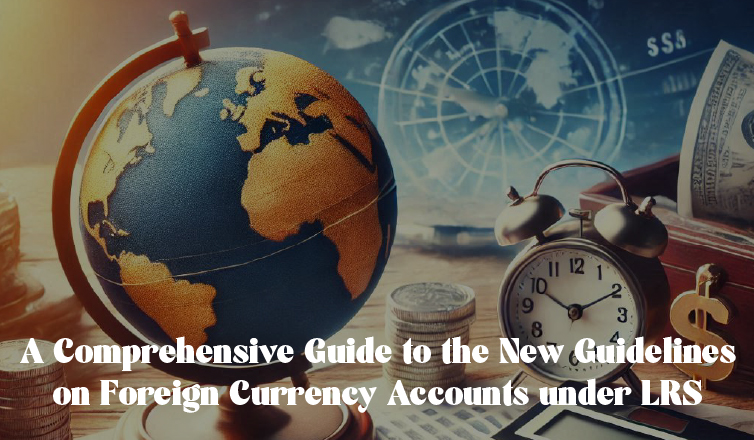Connect with us for all your queries



Before delving into the specifics of the new guidelines, it is important to understand the core concept of the Liberalised Remittance Scheme (LRS). LRS is an initiative by the Reserve Bank of India (RBI) that allows Indian residents to remit a certain amount of money outside India for various purposes. The main objective of LRS is to simplify the remittance process for residents, thereby fostering investment opportunities, facilitating education and medical treatments abroad, and promoting personal savings in foreign currencies.
Under LRS, individuals are allowed to remit up to a certain limit (currently USD 250,000 per financial year) for various purposes such as:
The remitted funds are typically routed through authorized banks, and the scheme is designed to provide a seamless process for residents to access international markets.
A Foreign Currency Account (FCA) is a special type of account designed to hold foreign currency deposits. For residents under the LRS framework, the IFSCA’s new circular outlines how these accounts can be used to receive remittances and manage foreign funds. The circular provides detailed operational guidelines for IFSC Banking Units (IBUs) to open and manage these accounts for Indian residents.
FCAs have become an essential tool in the banking industry, offering flexibility in managing foreign currency transactions. Indian residents can now use these accounts to engage in international transactions, manage remittances, and participate in global financial markets.
Key Provisions of the IFSCA Circular: Detailed Breakdown
1. Scope and Applicability of the Circular
The circular is primarily applicable to IFSC Banking Units (IBUs) that open and manage Foreign Currency Accounts for Indian residents. These accounts are opened in compliance with the Liberalised Remittance Scheme (LRS) and are meant to cater to remittances for specific purposes as permitted by the RBI.
The IFSCA's directive covers several areas:
2. Opening and Managing FCAs
3. Managing and Repatriating Funds
4. Using FCA Funds for Financial Products in IFSCs
Investment in Financial Products: One of the major features of this circular is the flexibility it provides for using FCA funds within India’s IFSCs. Indian residents can now use the funds in their FCAs to invest in various financial products and services offered within the IFSCs. This can include:
Purpose Declaration for Investments: IBUs must obtain a declaration from the account holder confirming that the funds being used for financial products in IFSCs align with the original purpose of the LRS remittance. This ensures compliance with the regulatory framework and prevents misuse of the funds.
5. Remittances to Foreign Jurisdictions
Permitted Capital and Current Account Transactions: The FCA can also be used to remit funds abroad for permitted capital and current account transactions. These could include:
Restrictions on High-Risk Countries: The IFSCA guidelines impose strict restrictions on remitting funds to countries identified as high-risk or non-cooperative by the Financial Action Task Force (FATF). The list of these countries is published by the FATF and updated periodically.
Anti-Terrorism and AML Compliance: IBUs are mandated to ensure that no funds are transferred to individuals or entities involved in activities that pose a significant risk to global security or are linked to terrorism. The IFSCA ensures that these measures comply with Anti-Money Laundering (AML) and Counter-Terrorist Financing (CTF) regulations.
6. Digital Banking and Seamless Operations
7. Compliance and Reporting Requirements
8. Conclusion: Strengthening Transparency and Compliance
The IFSCA's December 2024 circular on Foreign Currency Accounts under the Liberalised Remittance Scheme is a game-changer for Indian residents looking to manage foreign remittances and engage with global financial markets. By laying down clear guidelines for opening, managing, and using FCAs, the IFSCA ensures that Indian residents can take full advantage of the opportunities offered by international financial markets, while maintaining compliance with regulatory standards.
The new guidelines emphasize the need for transparency, compliance with Anti-Money Laundering (AML) and Counter-Terrorist Financing (CTF) regulations, and digitalization of banking services to enhance user experience. Through these steps, the IFSCA aims to create a robust framework for managing foreign currency operations in India’s International Financial Services Centres, ensuring that the system remains secure, efficient, and fully compliant with international standards.
As the world of international finance continues to evolve, these guidelines provide a much-needed clarity for both residents and banking institutions, fostering a compliant and transparent environment for foreign currency transactions under the LRS framework. With the emphasis on digitalization and compliance, the future of cross-border remittances and foreign currency management looks promising.
Tax Partner is India’s most reliable online business service platform, dedicated to helping you in starting, growing, & flourishing your business with our wide array of expert services at a very affordable cost.